
by World Moms Blog | Oct 22, 2014 | 2014, Africa, Awareness, Being Thankful, Caring, Casting a Wider Net, Communication, Economy, Education, Girls, Government, Guest Post, Helping, Human Rights, Humanitarian, Humanity, Inspirational, International, Life, Loss of Child, Media, Motherhood, Nigeria, Older Children, Poverty, Prejudice, Relationships, Safety, School, Social Equality, Terrorism, Tragedy, Women's Rights, Working Mother, World Mom Feature, World Motherhood, World Voice
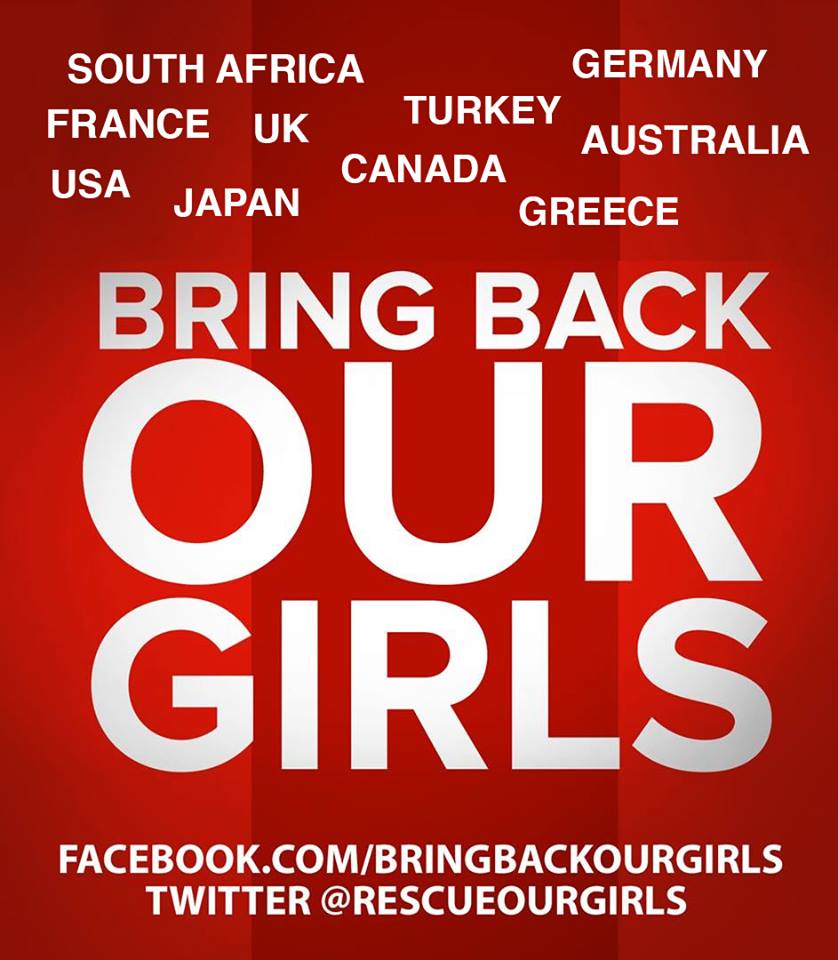 “My daughter said she was going to go to school so that she can wipe away my tears. How is she wiping my tears away in the den of the terrorists?”
“My daughter said she was going to go to school so that she can wipe away my tears. How is she wiping my tears away in the den of the terrorists?”
-mother of one of the #ChibokGirls, abducted on April 14th, 2014, speaking on Day 188 of their abduction -October 19th, 2014
As I looked at her I realized that all this woman’s hopes and aspirations rest on her daughter. For most of the poor people in this part of the world, children are like a source of pension; they are the ones that will help you in the future. They are the ones that will take care of you in your old age, when you are unable to look after yourself. They represent life. As I looked at her I also realized that her daughter means more to her than I can ever imagine. Her daughter is her everything. A source of hope.
These parents are ready to give their lives for their children to have an education. That was what the #ChibokParents did. Amidst the insecurity in Nigeria, they still wanted their children to be educated to better their positions in life. They knew the only way to break the shackles of poverty was through education. For daring to send their children to school to have a better life, instead they have been punished.
These children grow up to not only take care of their parents but siblings as well so that a generation of people who have survived the shackles of poverty would emerge.
For some, poverty is going to school in the morning without breakfast and returning home not expecting lunch but still striving everyday to be in school so that one day you will look back and say I SURVIVED (I AM A SURVIVOR).
I remember one of the fathers at one of our Sit Ins for the #BringbackOurGirls campaign—which started on April 30th with a protest demanding for the rescue of #ChibokGirls—saying he does not have a Television. All he has is a Radio from which he gets to hear of our activities. I wept! In this day of iPads, Tablets, iPhones and what have you, someone does not have a simple television that most of us take for granted.
So now you can begin to understand that to the #ChibokParents these girls are much more than daughters, they are future benefactors
A lot of parents, especially mothers, are forced to live a life of servitude and poverty in order for their children to be educated. The education that is taken for granted in most developed countries is not so in Nigeria and many other African countries.
I remember growing up and how my parents had to struggle to make sure we were educated. We often had to go without food when the situation grew dire but never were my school fees unpaid. I remember my father trekking long distance to buy a textbook I needed badly because the money was not enough for him to pay for a bus. All the suffering was for the children to be able to break the vicious cycle of poverty and one day to be able to take care of ourselves and also take care of our parents and siblings.
A lot of parents invest all they have in their children. For those who are poor, they do not have cars, houses or any investments. All they have are their children. Can you imagine these children being abducted, as is the case with the #ChibokGirls, abducted from school, where they wanted to get an education and make life better for themselves and their families? When these children of the poor are abducted and taken away, the future of a whole generation also is taken away.
As I looked at the woman with tears streaming down her face, all I could see was my own mum, who had to be the head-of-household, who worked all day and night to ensure I had an education. I look back to the days when there was no food to be eaten and yet we found our way to school. I thought of what a burden it must have been for my parents to get us educated, to sacrifice all that they had.
While some of my parent’s contemporaries were busy enjoying life in the way they could with what they had, my parents tightened their belt to make sure that we, their children, had an education and of course today we are their pension. If any of us had been abducted while seeking an education, where would we be today?
As I stood watching the Chibok mother, all I could think about was my mother struggling to give her children the life she did not have and how hard she worked to provide that for us. I thought of my mother, now living in the lap of luxury because she worked so hard four sake. As I stood looking at the Chibok Mother, I realized she too must be allowed to break the shackles of poverty. She too must live in comfort, as her daughter promised her. Her tears must be wiped away. As I stood looking at her I realized that I cannot stop demanding for the rescue of the #ChibokGirls, for that Chibok mother who has given her all, hoping that one day her tears would be wiped away.
I realized that I must demand the rescue of the Chibok girls.We all must.
Demanding the safe return of the Chibok girls to me is like making a demand for the ME that was 23 years ago. As I stood I realized that no matter how hard it gets, no matter how much we are intimidated and harassed, no matter the threat of arrest from our government, I cannot afford to give up on the #ChibokGirls.
To give up on the #ChibokGirls is to give up on myself (the WHO that I have become) and to give up on the mother with tears streaming down her face, waiting for her daughter, who promised to wipe away her tears.
This is an original, Guest Post for World Moms Blog from our sister in Nigeria and mother of two, Aisha Yesufu.
Aisha Yesufu was born in Kano, Nigeria. When she turned 40, in December 2013, she decided it was time to devote her life fully to the services of others. As she describes it,
‘The first 40 years of my life I devoted to myself, so I could be financially independent and help others. But they say: you can’t help the poor by being poor yourself, so the next 40 years, God willing, I am going to devote to others; for me, a full life will be based on what positive differences I have made in the life of another.”
And in came the unfortunate tragedy of the abduction of the #ChibokGirls. Following their abduction, on April 14th 2014, Aisha joined a group of like minded people to demand the rescue of the 219 school girls, who still today remain in the hands of the terrorists. These girls, between the ages of 16 to 18, were abducted from their school, in their quest for knowledge. The group known as the #Bring Back Our Girls campaign has been able to push the issue of their rescue in public discussion both locally and internationally.
Aisha is the coordinator of the daily Sit In for the #BringBackOurGirls campaign group. The group has, without fail, come out daily since the 30th of April, 2014, despite all forms of intimidations and harassment by sponsored persons.
To get involved in the conversation and learn more about the plight of the 219 Nigerian School Girls, visit: #BringBackOurGilrs
World Moms Blog is an award winning website which writes from over 30 countries on the topics of motherhood, culture, human rights and social good. Over 70 international contributors share their stories from around the globe, bonded by the common thread of motherhood and wanting a better world for their children.
World Moms Blog was listed by Forbes Woman as one of the "Best 100 Websites for Women 2012 & 2013" and also called a "must read" by the NY Times Motherlode in 2013. Our Senior Editor in India, Purnima Ramakrishnan, was awarded the BlogHer International Activist Award in 2013.
More Posts

by World Moms Blog | Sep 17, 2014 | 2014, Guest Post, South Africa, World Motherhood
Today we welcome a guest post from South Africa! Karien Potgieter is a full-time working mom of two kids aged two and under. She loves nothing more than to load up the double jogging stroller and set off on adventures with Little Miss K and Baby J – together they dream of running the world! You can follow their adventures at www.runningtherace.co.za. Here, she introduces us to what she calls, “Planet Parenthood”. It’s a hoot! Read on…
Becoming a parent for the first time is a bit like entering a whole new universe. For nine long months little old ladies scare you with old wives’ tales; complete strangers feel enticed to make unwanted comments about your body shape; and discussions with your caregiver border on TMI. But no-one tells you about Planet Parenthood – it’s one of the best-kept secrets of humanity.
A parent’s first encounter with Planet Parenthood happens even before the birth of an offspring. Whether you have a natural home- or hospital birth, or a C-Section, you’ll quickly find that there is no such thing as dignity in your new galaxy. What was once considered to be, ahem, private business, isall of a sudden out in the open for entire medical teams to see. And the weirdest thing about it? No one bats an eyelid. Not even you, because meeting your bundle of joy is way more important. Welcome to parenthood.
The second sign that you now find yourself in a new solar system, is the fact that sleeping, which was once regarded asbeing vital to performing your daily tasks with gusto, is all of a sudden optional.
Who wants to sleep when you can party around a crib all night anyway? And don’t let the fact that others, who are not from the planet of parents, intimidate you with their well-rested physiques and bushy-tailed appearances – looking fresh is way overrated anyway.
But those are just your initial weeks on Planet Parenthood. It gets way, way more interesting than that. Squeamish? You’ll soon get over it. Because there is no such thing as being prissy about bodily fluids on Planet P – everything goes. In fact, everything goes all over you! Gone are your days of going to the shops without boogies on your sleeve. Or in your hair. Or organic pumpkin puree artistically smeared all over your shoulder. It’s your new normal – and you’re okay with it.
Strings and strings of hard-earned tertiary qualifications are furthermore also of zero relevance on your new planet. Because instead of having hoity-toity discussions with others about the nation’s contribution to global warming, or the pros and cons of fracking the Karoo, the majority of your conversations for the next three or four years will revolve around Pajanimals. And Telly Tubbies. And the risks involved with sitting too close to the sofa’s edge. And what will perhaps surprise you the most, is that you will actuallystart looking forward to your daily dose of Shaun the Sheep. And Justin’s House. Don’t you even try to fight it.
Perhaps the reason why everyone is so hush-hush about PlanetParenthood is the fact that it grows on you.
After the initial shock that comes with finding yourself in completely foreign surroundings, you find yourself adapting. And growing. And liking it more and more. Until suddenly, one day, you realise that you don’t want to live anywhere else. Viva Planet Parenthood!
This is a guest post from South African writer, Karien Potgieter of www.runningtherace.co.za.
Photo credit to the author.
World Moms Blog is an award winning website which writes from over 30 countries on the topics of motherhood, culture, human rights and social good. Over 70 international contributors share their stories from around the globe, bonded by the common thread of motherhood and wanting a better world for their children.
World Moms Blog was listed by Forbes Woman as one of the "Best 100 Websites for Women 2012 & 2013" and also called a "must read" by the NY Times Motherlode in 2013. Our Senior Editor in India, Purnima Ramakrishnan, was awarded the BlogHer International Activist Award in 2013.
More Posts
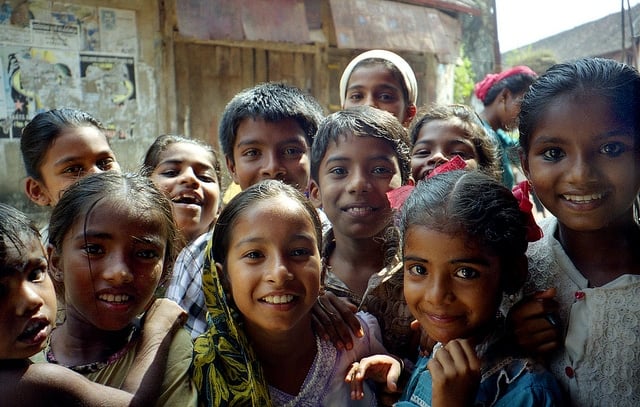
by World Moms Blog | Aug 28, 2014 | 2014, Awareness, Being Thankful, Childhood, Cultural Differences, Culture, Domesticity, Education, Eye on Culture, Family, Grandparent, Guest Post, Home, India, International, Kids, Life Lesson, Motherhood, Nutrition, Parenting, Relationships, Traditions, World Motherhood, Younger Children
 Motherhood is one of the most beautiful experiences of a woman’s life. Raising children makes life full. I am raising my children in India and I feel that the environment in India helps a lot in inculcating a strong set of values.
Motherhood is one of the most beautiful experiences of a woman’s life. Raising children makes life full. I am raising my children in India and I feel that the environment in India helps a lot in inculcating a strong set of values.
I read a lot about the many ways children are raised in various parts of the vast Indian subcontinent. Here are some of the enriching reasons I find raising a child in India so wonderful:
1. Family Help: India is a country where the joint family system is prevalent. Children grow up having a lot of fun surrounded by generations of Grandparents, Uncles, Aunts and Cousins. This helps the child in her personal growth and instills great concepts like teamwork and adjusting to different kinds of people, with different mindsets. It also helps a child understand how to receive and give unconditional love.
Sadly, the joint family is breaking up nowadays and giving way to nuclear families. The nuclear family comprises of just the husband, wife and children. Sometimes, the husband’s parents come to stay. This helps build a strong bond between the children and the grand parents, which should be encouraged. The child will learn to respect traditional values which are an integral part of the Indian social fabric.
2. Learning to Respect Your Elders: Indian children are taught to respect their elders and extended family at a young age. Being around so many family members, children learn to show respect and love to one and all when they grow up. Some communities in India make it compulsory for the young people to touch the feet of the elders as the mark of reverence.
This custom is rarely found in any other culture across the world. This custom is instilled in the child’s mind from a very young age and it becomes second nature. This custom hasn’t changed even after western ideas and practices stealthily crept into India.
3. Kids Are Taught How to Save: Children in India are taught to save and not spend unnecessarily. Due to the conservative economy, Indian children learn at a very young age to prioritise their expenses. They learn to buy things which will give them value for money.
Nowadays many banks offer the option to open minor accounts for very small children. Instead of having children save their pocket money in piggy banks, they can save it in real banks. This teaches the child banking procedures at a very early age. Children can even maintain a separate copy for calculating the total expenditure. This will teach the child that it is not good to waste money.
4. Family Values: Children are inculcated with strong family values as they grow up among numerous family members. These family values help develop strong moral fiber. In the long run, they help in creating a strong personality which helps in their growth.
5. Character Development: Character defines how the child leads a holistic life. Parents in India work hard on character building for their child. Since all parents’ desire that their child grows up to become an honest and good human being.
6. Spiritual Discipline: Indian children are raised with enormous spiritual discipline. India is the land for spiritual growth and developing the spiritual qualities in a child helps him/her grow up to be a better individual. Children are taught about the importance of religion and customs. They are also taught to respect other religions as well, since the common idea of all religion is to achieve peace, moral strength and happiness.
7. Freedom When They Play: There is no requirement for an organized play time. A child will always find a group of children playing outside his house. So they can always find fun. They can step out any moment and experience a joyous playtime. Open spaces or children’s parks are still there and are not encroached by developmental activities and high rises.
8. Sharing and Caring: There is a lot of sibling bonding in Indian families. Parents teach children tolerance towards each other, love and patience. By sharing and caring for each other, this turns them into well-adjusted human beings.
9. Celebrating Traditions: India has one of the richest cultures which dates back more than 5000 years. So India is a land of festival and colors, cliché as it may sound, it is true. These celebrations are elaborate. All the kids are involved in the celebration of the festivals with the other children in the community. The children celebrate the festivals with their families and extended families.
10. Healthy Eating Habits: Emphasis is laid on eating healthy food. Children are allowed to eat junk food once in a while, but mothers cook at home. They are happy to feed the children with home cooked food. This makes the child health conscious. Mothers teach their children to choose healthy fresh fruits and vegetables. This also increases their knowledge about what is good for them.
The above stated facts hold true for a small portion of the Indian population, as the phrase goes ‘the privileged few’. Economically, India has progressed considerably in the last 60 years. The bigger picture, however, is quite different: a farmer hangs himself from a tree because he cannot provide for his family; a child is shunned from temples and public places due to his lower caste label; the rampant poverty in villages and lack of health amenities lead to reduced life expectancy; more children are seen carrying bricks and working in factories than in classrooms. These are children who don’t have access to formal education at all.
But for increasingly more kids, growing up in India is a blissful experience which helps them develop into amazing individuals. The calmness of spirit and the enriching environment in India is what gives these children an opportunity to explore life and themselves. The liveliness of the child is based on the amazing cultural forum that the Indian child inherits.
In contrast, malnourished children peddle the streets and somehow make a living. They are deprived of things that my child claims as basic rights. We have small children selling chai when they should be drinking a warm glass of milk instead. Yet from children like these, a leader has emerged – Narendra Modi. The contradictions and ironies of my country keep me enthralled. I trudge forward in earnest hope that my child will triumph in all spheres of her life.
Also, the technological development and fast paced life have made us so busy that we are finding less and less time for each other but still Indians never forget to smile at one another. Children brought up in India will never lose heart, since they have learned to struggle and attain victory in all fields of life. But to make that happen, we need to remember the wisdom Dr. Seuss imparted:
“Unless someone like you cares a whole awful lot, nothing is going to get better. It’s not.” — The Lorax
The image used in this post is credited to Ryan Ready. It holds a Flickr Creative Commons attribution license.
This is a first-time, guest post from Aradhana, a mother in India. Aradhana also is a passionate writer, who focuses on topics like yoga, wellness, health and lifestyle. She has contributed posts to Natural News, Wiki How, MomJunction, and Elephant Journal. Through her writings, she hopes to motivate people to develop healthy habits and adopt natural ways of living to achieve sound health.
World Moms Blog is an award winning website which writes from over 30 countries on the topics of motherhood, culture, human rights and social good. Over 70 international contributors share their stories from around the globe, bonded by the common thread of motherhood and wanting a better world for their children.
World Moms Blog was listed by Forbes Woman as one of the "Best 100 Websites for Women 2012 & 2013" and also called a "must read" by the NY Times Motherlode in 2013. Our Senior Editor in India, Purnima Ramakrishnan, was awarded the BlogHer International Activist Award in 2013.
More Posts

by World Moms Blog | Jul 22, 2014 | 2014, Family, Grandparent, Greece, Guest Post
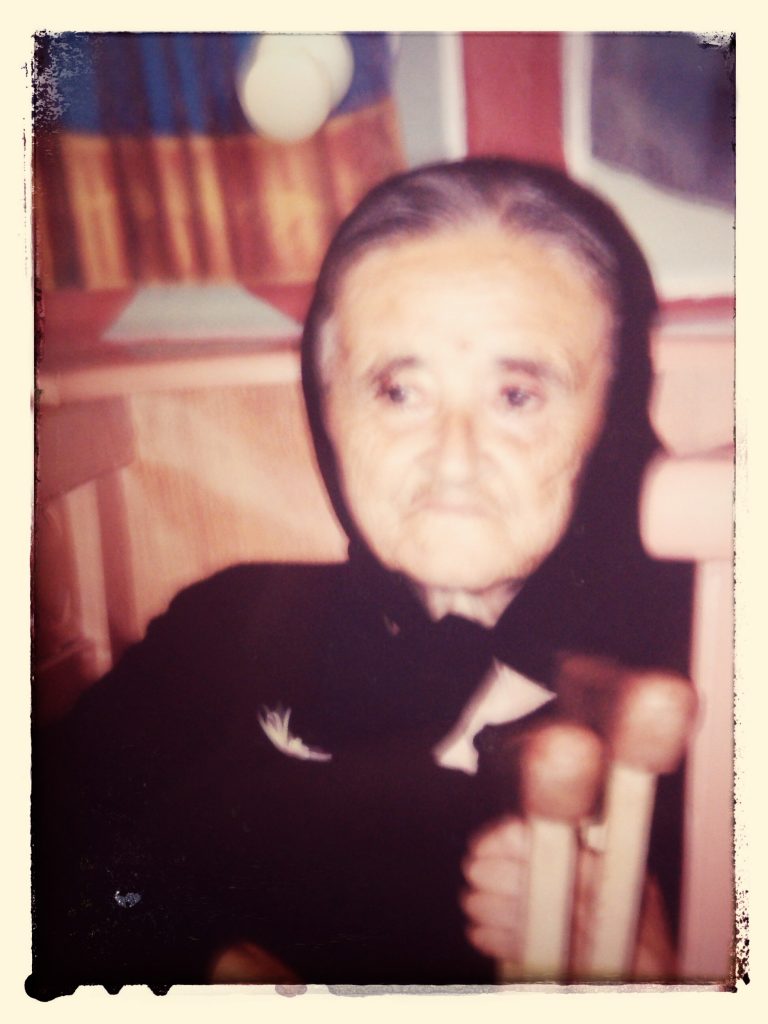
The Super Greek Gran of this story is pictured above.
The greatest invention EVER!!!
I hope that all you moms out there are coping with and even ENJOYING your summer vacation! Having kids at home all day and every day can be challenging even for the most organized, and creative of us, especially if we also have to work outside the home.
Do you have help with feeding, entertaining, and generally nurturing your offspring?
I wonder how many of you busy multi-taskers are as blessed and fortunate as I am to have a super-soulmate, super efficient ma-in-law to LITERALLY pick me up when I’m down and totally out of action…and yes, I did say
Mother-in-law.
I have been bedridden for a while and in excruciating pain due to 3 herniated discs on my spine which have plagued me for years. Yiayia (Greek for grandma) makes sure that I have priority in getting meals and having clean clothes, then gets to work doing the same for my hubby and two teenage sons. She makes mouth watering traditional Greek pies and delish soups, so believe me, it’s almost worth suffering flat on my back so that she makes her culinary delights for us!
It’s hard to believe she was born with a severe physical disability and has undergone a series of operations over the years on her legs and hips. Although she can only walk with the aid of crutches, her doctors say that it’s a miracle she is mobile at all! At 83 years old, I truly admre her abilities and her absolute dedication to her three children and their families. The great news is that she is typical of women from her culture and generation.
In Greece, Yiayia is greatly respected and in many households a godsend for working moms. Having a hot meal on the table when your tired daughter/daughter-in-law gets back from work is an example of what Greek grannies consider their duty. Believe me, these ladies REALLY know how to cook!!! Imagine the quality of food our offspring are getting as no Greek from this generation puts takeaway or prepacked food on the table. This would be an outrage! Only dishes based on the Mediterranean diet, passed down from generation to generation are considered good enough for nurturing a healthy family. Really great, right? So, even if at times you might not see eye to eye with the older members of your clan-Greeks are exceptionally clannish-then try to remember that goodwill, especially towards your mother-in-law, has more benefits than negative aspects!
I know that in most cultures around the globe the mother/daughter-in-law dynamic is considered to be one of the trickiest and sticky to manoeuvre.
Haven’t you ever felt at some point in your relationship with the in-laws that a fistful of Prozac or a bowl full of magic mushrooms would be a blessed relief?
Come on now-be honest!
More often than not one or both women feel a need to have the upper hand when competing for the attentions of hubby/son as well as children/grandchildren. At least in the beginning of the relationship with our new partner things can be pretty tumultuous until the boundaries and expectations are (hopefully) worked out.
My relationship with my Greek in-laws was definitely tumultuous when I first came to live in the family home 16 years ago! My husbands father was certainly NOT pleased when his boy came home with the XENI NIFI or foreign bride!!! Remember that great comedy; MY BIG FAT GREEK WEDDING ?
That wasn’t a comedy for me but MY LIFE!!!
It’s truly staggering how my relationship with my (now) beloved ma-in-law has progressed over the last one and a half decades! These days I think of Grandma Vasiliki as my own mother who ALWAYS supports me if I have a disagreement with her son. My poor hubby is pretty fed up hearing from his own mother that I’m more practical and wiser than he is (even if it IS true) and therefore I should have the final say in any major family decision making! I sometimes wonder if he rues the day he brought me to live in the family home. After all, the two women who are closest to him have become loving allies and so he can’t get away with anything. AT ALL! There are two sets of beady eyes constantly watching him…sound a little spooky? Well, I’m more than half Greek myself nowadays and I can tell you most Greek families really DO tend to live in each others pockets! I was actually born in the UK but such close proximity and familiarity would be considered very claustrophobic there. In Greece however, every family member feels they have a right to express an opinion about all things great and small, whether it concerns them directly or not! Usually Yiayia has the final pearl of wisdom to share…and more often than not is the wisest of all.
My husband has a great saying in Greek we use when we need a babysitter, cook, housekeeper or a shoulder to cry on. I find it hilarious although it loses something in translation;
“Greek Super Grans- the greatest invention EVER!”
Do you have a mom or mother-in-law to help out when things are tough?
Would you like someone to be this close to you and your family, or would you consider it too interfering and claustrophobic in your culture/part of the world?
What types of behavior would you find acceptable or not acceptable from a grandma?
Enjoy the rest of your vacation wherever in the world you may be!
This is a guest post by Ann Marie Wraight who lives in Greece.
World Moms Blog is an award winning website which writes from over 30 countries on the topics of motherhood, culture, human rights and social good. Over 70 international contributors share their stories from around the globe, bonded by the common thread of motherhood and wanting a better world for their children.
World Moms Blog was listed by Forbes Woman as one of the "Best 100 Websites for Women 2012 & 2013" and also called a "must read" by the NY Times Motherlode in 2013. Our Senior Editor in India, Purnima Ramakrishnan, was awarded the BlogHer International Activist Award in 2013.
More Posts

by Susie Newday (Israel) | Jun 18, 2014 | 2014, Awareness, Guest Post, Israel, Kids, Media, Motherhood, Parenting, Safety, Terrorism, World Voice
Below is a guest post by Joanna Landau, the founder of Kinetis. I turned to her when I was struggling to write a post about 3 teenagers kidnapped in Israel by terrorists. I knew I wanted to bring attention to the situation because I have been appalled at the lack of press this situation was getting around the world. Fellow World Moms confirmed for me that in their respective countries, the news was getting close to no coverage and in many instances, no coverage at all. Yet here in Israel, no one has thought about anything else for the past 6 days. Joanna has managed to capture all my thoughts and feelings. Please share her message.
The phone rings. “Hey, Mom, it’s me”, your 16 year old son says, “I’m on my way home”. You put the phone down, and go back to whatever it is you’re doing. An hour later, you start to worry, he’s not answering his phone. Two hours later you and your husband start to panic, you call friends, relatives, start canvassing the neighborhood. Three, four, five hours later, you know something’s happened. And then you realize you’ve joined that awful statistic, something’s happened. Turns out your son hitchhiked his way home with a couple of friends, and has been kidnapped. Your worst fears have come true. And now what? What would you do to bring him back, assuming the police are doing everything they can to find him?
There’s a boy called Naftali, and he was kidnapped together with his friends Gilad and Eyal 6 days ago. Naftali called his mother, a half an hour before he got into the car.
This is not a hypothetical situation. It happened in Israel and you may have not heard of it, because it sounds like the kind of thing that can happen in a place where there’s a conflict going on.
And some may put a political twist on it, bringing in all sorts of issues that can cloud the basic, simple fact that three youngsters have been kidnapped.

In Israel it’s the only thing on our mind, as a nation fears for three kids, not soldiers, who have disappeared, apparently taken by terrorists. But it’s not a political story: for every mother, wherever you live, it’s a personal story. Because these things can happen anywhere, and children and teens have become innocent victims of the evils of this world.
In America it may be from a shooting spree at a school, in Nigeria it’s girls at a boarding school. In any country, it may be a bitter divorced parent who takes their kids without telling the ex-spouse; or it can be a sick person who preys on children. Kidnapping can be anywhere, it can happen to anyone.
Gilad, 16 years old, likes to bake and volunteers with youth his age. Apparently, when he steps into a room, his smile lights it up. Naftali plays the guitar, loves football and is an excellent student. Eyal is 19, likes to sing, and sang at his cousin’s wedding not long ago. These are kids, just like yours. They don’t represent the state, they probably never imagined they would. But everyone is turning this into a political, or diplomatic discussion. It’s not. It’s about how fragile this world is and whether you care.
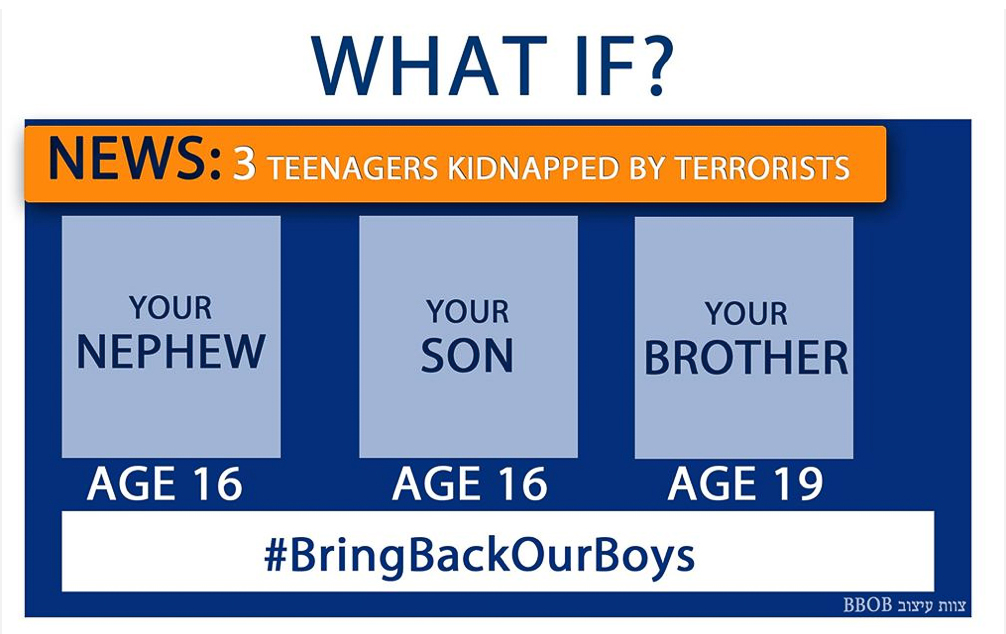
Imagine it was your kid who phoned 6 days ago. Imagine what you’d be feeling today, knowing he’s in the hands of merciless terrorists, or worse. I’m usually a very positive person, with an optimistic outlook on life and a constant desire to make the most of what we have. But as I look at my own three kids, who are 12, 10 and 7 and home safely with me, I wonder how Naftali, Gilad and Eyal’s parents must be feeling.
Premised on the #BringBackOurGirls campaign to raise awareness for the kidnapping of the Nigerian girls, a campaign to #BringBackOurBoys has also exploded online. But only in Israeli and Jewish circles, and hardly in traditional global media sources. Because everyone else is looking at this and just moving on.
If you’re a mother, and you understand how it feels to love your child, and if you believe that children, more than anyone, are innocent until proven guilty, you can’t and shouldn’t remain indifferent to this incident. If you have a 16 or 19 year old kid, hug them tonight, and if these words resonate with you, snap a quick selfie together and help the world #BringBackOurBoys .
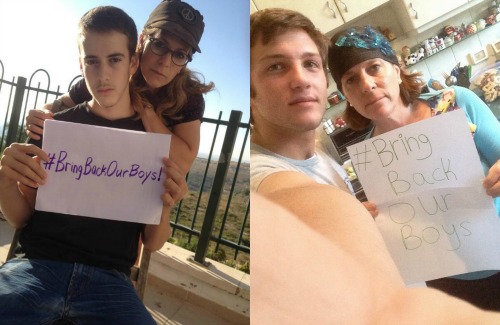 Photo Credit: Maya Ben-David & Avner Seliger
Photo Credit: Maya Ben-David & Avner Seliger
This was an original guest post for World Moms Blog by Joanna Landau.
Joanna Landau is the mother of 3 as well as the Founder & Executive Director of Kinetis, a non profit social startup promoting Israel as a hub of creativity and innovation. Kinetis brings leading bloggers from around the world to Israel to experience it for themselves. In addition, Kinetis operates educational programs in Israeli schools, the Army and Universities that aim to reignite national pride.
Susie Newday is a happily-married American-born Israeli mother of five. She is an oncology nurse, blogger and avid amateur photographer.
Most importantly, Susie is a happily married mother of five amazing kids from age 8-24 and soon to be a mother in law. (Which also makes her a chef, maid, tutor, chauffeur, launderer...) Susie's blog, New Day, New Lesson, is her attempt to help others and herself view the lessons life hands all of us in a positive light. She will also be the first to admit that blogging is great free therapy as well. Susie's hope for the world? Increasing kindness, tolerance and love.
You can also follow her Facebook page New Day, New Lesson where she posts her unique photos with quotes as well as gift ideas.
More Posts - Website
Follow Me:






by World Moms Blog | Mar 10, 2014 | 2014, Awareness, Bilingual, Communication, Cultural Differences, Culture, Elections, Eye on Culture, Guest Post, Human Rights, Humanity, International, Language, Life Lesson, Living Abroad, Media, Multicultural, Politics, Tragedy, USA, World Events, World Interviews, World Motherhood, World Tour, World Voice
Today, we have a special guest post by a Ukranian mother living in the United States, Olena Centeno, of Bilingual Kids Rock. Olena opens the window and lends us her personal perspective to the current events in Ukraine…
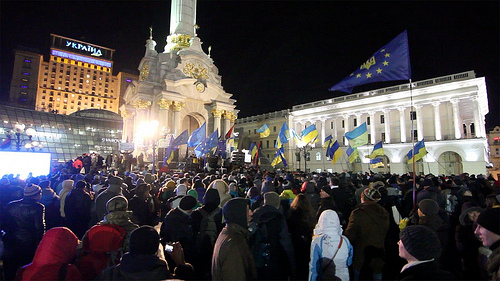
Protest in Kiev, November 2013
What’s it like growing up in Ukraine?
As a Ukrainian, I grew up speaking two languages: Russian and Ukrainian. I ate Ukrainian borsht for lunch and Russian pelmeni for dinner. I love Tchaikovsky’s Sleeping Beauty and Carols of the Bells by Leontovych. I am raising my own children trilingual in English, Russian and Ukrainian. In fact, the two cultures (Russian and Ukranian) are considered so close, that if an Ukrainian abroad says s/he is from Ukraine people often say “Oh, so you are from Russia?”
What’s going on between Russia and Ukraine?
With Russian troops moving across the sea into Ukraine’s Crimean peninsula, a lot of Westerners are starting to ask this question.
The current conflict in Ukraine is more than three months old. It began with a peaceful demonstration on November 21 at Independence Square (Maidan) in Kiev, the capital of Ukraine, when the (now ousted) Ukrainian president (Yanukovich) hesitated to sign an Association Agreement with the EU. This had been one of his major election promises and in breaking it he ignored the desire of millions of Ukrainians.
During the past three months, the “EuroMaidan” demonstration has grown into a much bigger movement. It started as a response to the failed EU deal but then truly turned into a movement against the corrupt government of president Yanukovich, who moved to keep Ukraine in long-lasting and very painful economical ties with Russia.
Then, after the government passed harsh, anti-assembly laws, it became about the basic human right to be able speak and think freely without being punished for it.
More than a hundred lives were lost and thousands injured during violent attempts to remove the demonstrators but people did not leave the cold streets of Kiev. More freedom fighters came from all over Ukraine to support them. Many other Ukrainian cities stood up as well. After three months of struggle, Mr. Yanukovich was impeached and left Ukraine (he refused to sign a resignation; he just ran away). His presidency was considered illegitimate and a new, temporary government was elected.
As Ukrainians were mourning over lives lost and looking into the future with great hope to build their country on principles of trust and freedom, a new enemy emerged: Informational War.
Along with Russia, Eastern Ukraine—where the majority is Russian speaking—is dominated by Russian-language news from the Russian media. Unfortunately, the Russian media coverage of events that have happened over the past three months is falsified [and full of propaganda].
Now, after the armed occupation of Ukrainian territory in Crimea by Russian troops, the reason for their untruthful reporting is understood: Creating social opinion in Russia and Russian-speaking Ukraine justifies military intervention into Ukrainian territories.
Personally, I think Mr. Putin has an imperialistic plan to be the most powerful ruler in modern history—politically and financially—and he will stop at nothing to add Ukraine to his control.
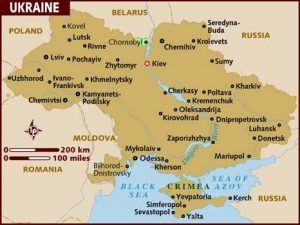
Russian Media Propaganda Uncovered
The following are all lies that have been spread by the Russian media leading up to the invasion of Ukraine by Russian troops:
1. FALSE: Kiev was Overrun by Violent Riots
Despite violent clashes, most of Kiev stayed peaceful throughout the demonstrations. The day-to-day lives of residents were largely unaffected outside of Independence Square and the areas immediately surrounding it. Very little of Kiev or the surrounding countryside was damaged or disturbed by the protests.
I know this because I called my family and friends every day. My nephews were going to school as usual, most of the people attended work on a daily basis, and all shopping malls and grocery stores were working (except for a few in the middle of the protest areas downtown).
2. FALSE: Anti-Russia Fascists Led the Ukrainian Protests
The vast majority of protesters were ordinary citizens tired of a government that they viewed as corrupt and unwilling to listen to the people. There were no fascist elements leading the demonstrations, and there are none leading the new government.
Many of the people I know personally were in Maidan: teachers, IT professionals, doctors, stay-at-home moms, businessmen, university professors, hair stylists and many others. People I worked with and went to school with. And no one will ever convince me that they are fascists. My daughter’s god-father is a surgeon and worked days and nights protecting the health and saving the lives of many.
3. FALSE: The New Government Will Force All Ukrainians to Speak Ukrainian
This is a particularly effective myth for Russian-language media, since it appeals directly to the people who would be most affected. Language has long been a contentious issue in Ukraine. Claims that Russian will be abolished are being used to generate anger against the new government.
The Ukrainian parliament voted to repeal a 2012 law allowing the establishment of minority languages as official state languages in individual provinces on February 23, 2014 but acting President Oleksandr Turchynov vetoed the move. Russian is currently recognized as an official language, is legal for state use in several Ukrainian provinces, and is guaranteed state protection “in all spheres of public life” in Crimea specifically.
I speak Russian and Ukrainian to my children here in the USA. I see language first and foremost as a tool for communication — and shame on any politicians who use it as a reason for war.
4. FALSE: Ukrainian Demonstrators Have Been Attacking Russians or Russian-Speakers
Another unproven and untrue claim widely circulated in Russian-language media is that the Euromaidan protesters were deliberately attacking Russian speakers.
The cruel result is that ordinary Russians – good, wholehearted, educated people – are now eager to help a Ukraine that they think is swamped by fascists! I have family in eastern Ukraine and my god-mother lives in Moscow. They have called multiple times, scared for the lives of my parents in Kiev. They really think Ukraine is in danger.
There is no evidence to support the claim, and nearly all cases of violence during the protest were perpetrated against civilians by security forces. The Euromaidan protests had very little to do with cultural or language issues in general.
While Yanukovych’s perceived obedience to the Russian government was certainly a source of anger in Ukraine, this anger was directed at the President and the actions of the Russian and Ukrainian governments, not to the Russian people or culture.
5. FALSE: The Berkut and Other Security Forces Fought in Self-Defense
Russian news broadcasts have shown extensive footage of the Berkut and other riot police under attack but nearly none of their attacks on civilians. The reality is that security forces attempted to crush peaceful protests with deadly force, and were barely driven back with improvised weapons like clubs and Molotov cocktails. The superior force and aggression were always on the side of the Berkut.
6. FALSE: The Independence Square/Euromaidan Protests Were Organized by Americans
We joke that EuroMaidan is now supported by Americans because my American husband and I made donations to help supply people with warm clothing and blankets during cold winter months.
I am not claiming that on a political level there is no lobbying of interests from outside countries and unions but once again: the politics of the country and the people of the country are two different things.
The vast majority of protesters were native Ukrainians and ordinary residents of Kiev and the surrounding country.
7. FALSE: Fascism Will Spread from Ukraine to Russia
This is another falsehood dependent on the idea that the Euromaidan demonstrators were fascist extremists. It is being used as a justification for Russian invasion. The Russian government claims it is defending Russian-speakers in Ukraine and its own borders from Ukrainian fascists but in reality those fascists do not exist.
What is next?
The military intervention is not over. It is hard to say what is going to happen next. There is a lot of talk going on at a very high, political level involving the EU and the US.
But Ukrainians have already had the biggest win in this struggle: themselves.
They proved to themselves that they care:
- They care about all of our people (amazing examples of collaboration happened during the civil unrest!);
- they care about the future of their country;
- they care about their freedom;
- they care enough to recognize the differences among themselves and to stay united anyway.
The revolution was heartbreaking and tearful but as a result, Ukrainians became true patriotic citizens of their country:
Glory to Ukraine, Glory to Heroes!
слава Україні, слава героїв
(slava Ukrayini, slava heroyiv)
For me, personally, it has been a life lesson in how to raise my own children. I have a clear goal to raise multicultural and multilingual children, who respect other languages and cultures and can see our shared humanity no matter how politicians try to divide us.
This is an original guest post to World Moms Blog by Olena Centeno.
 Olena Centeno is a Ukrainian who lives in USA, a happy mom of three wonderful kids ages 2-9 and a wife to the great. She speaks three languages herself and is raising her kids to be multilingual in English, Russian, Ukrainian and Spanish. She founded Bilingual Kids Rock, where she helps families on their bilingual journey. She also enjoys photography and video making as a way to preserve precious moments of life.
Olena Centeno is a Ukrainian who lives in USA, a happy mom of three wonderful kids ages 2-9 and a wife to the great. She speaks three languages herself and is raising her kids to be multilingual in English, Russian, Ukrainian and Spanish. She founded Bilingual Kids Rock, where she helps families on their bilingual journey. She also enjoys photography and video making as a way to preserve precious moments of life.
You can connect with her at Bilingual Kids Rock.
Photo credit to Oxlaey. This photo has a creative commons attribution license.
World Moms Blog is an award winning website which writes from over 30 countries on the topics of motherhood, culture, human rights and social good. Over 70 international contributors share their stories from around the globe, bonded by the common thread of motherhood and wanting a better world for their children.
World Moms Blog was listed by Forbes Woman as one of the "Best 100 Websites for Women 2012 & 2013" and also called a "must read" by the NY Times Motherlode in 2013. Our Senior Editor in India, Purnima Ramakrishnan, was awarded the BlogHer International Activist Award in 2013.
More Posts

“My daughter said she was going to go to school so that she can wipe away my tears. How is she wiping my tears away in the den of the terrorists?”






















